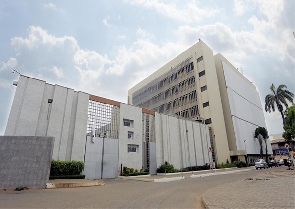Business News of Monday, 1 March 2021
Source: goldstreetbusiness.com
BoG unveils regulatory framework for crowd-funding
One of the newest forms of financing small enterprises and projects – one which is generating huge successes all around the countries that have embraced it – is now about to become formalized in Ghana.
The Bank of Ghana last week unveiled the basic frameworks for the two models for crowdfunding that fall under its regulatory ambit. These are the donation and reward models.
The other two models – the equity and debt models respectively – will fall primarily under the regulatory purview of the Securities and Exchange Commission, (albeit with close collaboration with the BoG itself) which has been working on the designs for their regulatory frameworks for the past year or so.
Actually, both financial services regulatory institutions will need to collaborate for all types of crowdfunding and crucially, both are already on the same page, looking to not just establish prudent regulations but to actively support and facilitate its use.
Actually, this form of financing already has an informal sector foundation in Ghana. Locally known as “susu”, “nnoboa”or “ntoboa”, the concept of crowdfunding is not new to Ghana and has traditionally been used by families, groups or communities to mobilize money to provide for the needs of their members.
Market women, fishmongers, farmers, traders, among other groups, have used this informal system for instance to raise funds for businesses, payment for medical bills, funeral expenses and the education of their children.
But now, leveraging on new technologies used in the financial services industry, this basic concept is about to be opened up to the general public to take part in enterprises and projects whose promoters are anonymous to each other but who are willing to pursue the same objectives. Technology-enabled platforms are revolutionalizing the crowdfunding system by extending the scope of fundable projects and the geographical coverage of service even beyond national boundaries.
Notes a release by the BoG last week: “In recent times, FinTech innovations in digital platforms and payments is revolutionalizing the crowdfunding system by extending the scope of fundable projects and the geographical coverage of service beyond national boundaries. High patronage of digital crowdfunding service has been observed among associations and corporate entities in order to raise money to fund development and humanitarian projects. This development holds potential for deepening financial intermediation and improving financial inclusion. As a result, it must be provided with a conducive regulatory environment for orderly development.”
One of the two crowdfunding models which the BoG is required to regulate is donation crowd-funding. Under this model, donors are usually empathetic to the initiator’s campaign and willingly give to the cause. Donors’satisfaction or reward is in the success of the campaign and expects nothing in return.
The other is rewards-based crowdfunding. With this model, contributors to a campaign are given non-financial rewards such as priority access to a successfully launched service or event. Registration on a reward-based crowdfunding platform requires the "Know Your Customer’’ (KYC) information for both funders and fundraiser in the registration process.
The other two crowdfunding models though are the ones that have the potential to transform the financing terrain for SMEs, particularly start-ups and early-stage enterprises.
Being that they are commercial funding sources for commercial, profit-driven enterprises and projects, SEC will be the lead regulator, being in charge of regulating the investment category of a financial asset, but will require close collaboration with the BoG which is the primary regulator of financial intermediaries and providers of payments platforms.
One is equity crowd-funding. This model is used to raise funds for start-up and early-stage businesses. Investors receive equity in the entity raising the funds or a share in its revenue.
The other is debt crowd funding also known as peer-to-peer lending.
Debt crowdfunding platforms provide an ecosystem within which lenders and borrowers interact. Individuals are able to lend money to individuals or businesses. For this reason, it is also referred to as Peer-to-Peer lending. Lenders receive interest on loans and are paid the principle upon expiration of the loan or successful completion of the project for which the loan was obtained.
All the crowdfunding models require both the fundraiser and the funder to do due diligence on the platform before considering to raise funds or to fund a project on the platform. The funder has the obligation to further research the fundraiser’s profile. Due diligence entails thorough research on the platform, fundraiser and project review, project platform reviews, project articles and studies, seminars and trade associations.
The fundraiser and funder sign up on the selected platform and agree to the terms and conditions on the platform after due diligence is done. It is required of the fundraiser to set the funding limits and define rewards (if applicable).
The fundraiser also submits documentation to the platform and provides responses to the funders’ questions. The funder on the other hand decides and confirms the funding amount and further makes payment online into an escrow account. After the target amount is reached, funds are transferred to the fundraiser minus fees and commissions charged by the platform while the funder receives any reward that is due.
In the situation where the target is not attained, funds are returned to the funders
The BoG asserts that extensive financial sector regulatory reforms within the past 10 years has laid the foundation for safe and efficient delivery of digital financial services.
It lists the relevant laws enacted to include Payment Systems and Services Act 2019(Act 987), Data Protection Act 2012(Act 843), Banks and Specialised Deposit-Taking Institutions Act, 2016(Act 930), Securities Industry Act, 2016(Act 929), Anti-Money Laundering Act, 2008 (Act 749), Deposit Protection Act,2016, (Act 931); and the Cybersecurity Act 2020.
The BoG further explains that donation and reward crowdfunding models require the ability to collect, hold and disburse payments. “These activities are fully covered by the Banks and Specialised Deposit-Taking Institutions Act, 2016(Act 930) and the Payment Systems and Services Act 2019(Act 987) and accordingly are in the regulatory domain of the Bank of Ghana. Application for approval to provide any of these services shall be sought from the Bank of Ghana.
Eligible financial institutions include banks, Specialised Deposit-Taking Institutions (SDIs), Dedicated Electronic Money Issuers (DEMIs) and Enhanced Payment Service Providers (EPSP). Dedicated Electronic Money Issuers (DEMIs) can provide these services under their license as defined in the Payment Systems and Settlement Act, 2019(Act 987) on account of they being issuers of wallet for money. Funds collected will reside in an electronic merchant wallet subject to the applicable transaction limit.
Now SEC will be expected to unveil its own regulatory framework and both it and the BoG will have to establish a framework for collaborative regulation of the industry.











